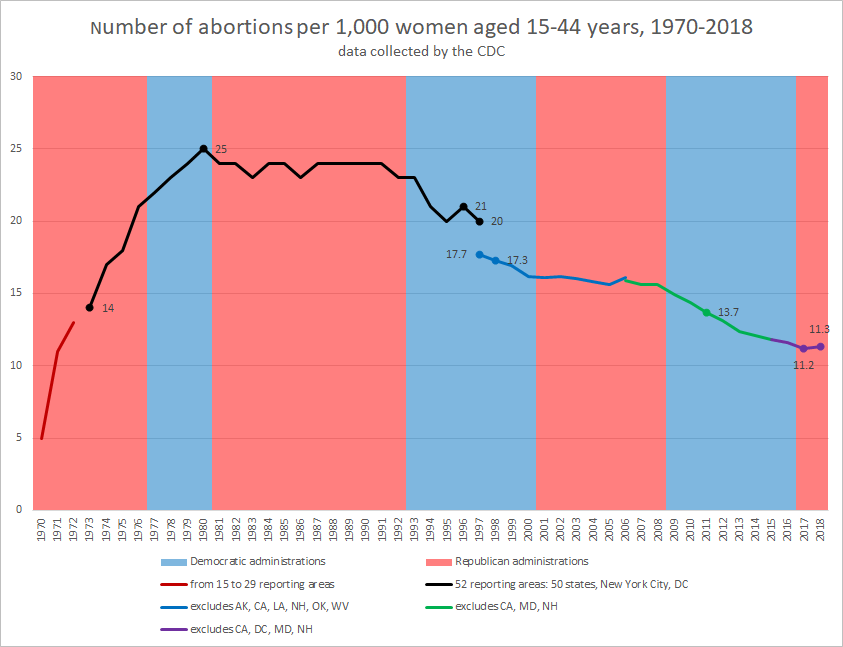Or at least, what if the causal arrow points both ways? Could evangelicals becoming more conservative/Republican have, in part, caused them to become more extreme on abortion?
Let's start with the historical basis, or lack thereof, for evangelical opposition to abortion. From an excellent NPR interview with historian Kristin Kobes Du Mez:
KRISTIN KOBES DU MEZ: In the late 1960s, we have this remarkable issue of Christianity Today, the flagship magazine of American evangelicalism, discussing this question of abortion. And the conclusion is that it's a very complicated moral issue. So there are theologians discussing precisely when ensoulment happens - when does the fetus become an actual life? - and weighing the complicated issues not just in terms of rape and incest, but also the health and well-being of the mother and the family. And, yes, the Southern Baptist Convention comes out in favor of opening up access to abortion in many cases in 1971, and then they reaffirmed that in 1974 and in 1976, so after Roe v. Wade.
But what happens in the 1970s is, first of all, with the passing of Roe v. Wade, you see a spike in the number of abortions. And that causes many Americans, not just evangelicals, to kind of rethink is this what we wanted? But I think more importantly, you have the rise of second-wave feminism and, in conservative, white, evangelical spaces, a real backlash against feminism. And over the course of that decade, abortion becomes linked to feminism. And so you see the sentiment start to shift so that in 1979, when political activist Paul Weyrich identifies abortion as a potential to really mobilize conservative evangelicals politically, to help build the Moral Majority, then it is a very effective mechanism for doing so. And from 1979 on, that's when you see a real kind of shrinking of space within conservative evangelicalism to have any view on abortion that isn't strictly and staunchly pro-life, life begins at conception.
It appears the alliance with the conservative movement happened approximately the same time as abortion becoming a defining issue for evangelicals, and that raises some interesting questions with the standard narrative.
And if we're doing standard narratives, where better than the Washington Post?
White Protestant evangelicals had voted for Jimmy Carter in 1976 — the first “born again” president — helping him narrowly capture the White House. But disillusioned over his handling of abortion, the Equal Rights Amendment and the tax exemptions for White religious schools, they had switched their allegiance to Ronald Reagan in 1980.
But this doesn't quite sound right. For starters, Ronald Reagan was the exact opposite of Jimmy Carter with respect to religion. Rather notoriously at the time, the Reagans were more inclined to consult astrologers than the clergy.
The Equal Rights Amendment was a strongly bipartisan issue in the 70s supported by Nixon, Ford, and Carter. It is true of that Carter's decision to extend the deadline for ratification was controversial (and anti-feminist backlash was real), but given that the amendment had largely stalled out a couple of years before, it doesn't seem like it should be a defining issue. As for white religious schools, it is important to remember that the alliance between Conservative Catholics and evangelicals is a recent development. Tax exemptions for religious schools was more of a Catholic than an Evangelical issue (though you certainly did have white flight protestant or nondenominational "Christian" academies). Back in 1980, evangelicals were deeply distrustful of Catholics with the more extreme members even comparing the pope to the Antichrist. Finally, though it is true that abortions spiked during Carter's presidency, they had been trending up for years and as we saw above this was not an issue that historically had defined evangelicals.

There had to be something more that drove white evangelicals from the old-time religion Jimmy Carter to the new age mumbo-jumbo of Ron and Nancy.
What's the missing factor or factors? I don't know. But there are a few things I think did play a role.
The conservative movement made a massive effort to find and reignite reactionary embers around the country, ugly things that were on their way to dying before the movement stepped in. Carter had defeated Lester Maddox. Winthrop Rockefeller and Dale Bumpers had defeated Orval Faubus. The segregationist movement in the South was appearing to fade before the election of Ronald Reagan and the triumphant conservative movement came in to administer life support.
I'm not as familiar with the history of the anti-abortion movement, but it seems entirely reasonable that the same sort of thing could have happened there is well. Making C. Everett Koop surgeon general fits perfectly with this view. Koop, though highly qualified, was mainly known as a militant spokesman for the anti-abortion movement and was the ideal figure for staking out the position and promoting it to religious voters. He also turned out to be a man of actual principle, which came back and bit the Republicans in the ass in a big way, but that's another story.
The late 70s and early 80s also marked the rise of be enormously corrupting influence of televangelists and mega churches. There have always been religious hucksters and tent show preachers and yes, you had people like Aimee Semple McPherson and Billy Graham earlier who achieved remarkable influence and financial success, not to mention infamous figures like Father Coughlin, but the level of money and power that could be gained in the televangelism era of the 70s and 80s dwarfed what came before. Combined with the unmitigated evil of Prosperity Gospel, the potential for corruption was almost unprecedented. The Falwells, the Robertsons, the Swaggarts all had a tremendous incentive to align themselves with the conservative movement. They were obscenely wealthy, terrified of scrutiny and regulation. Perhaps more importantly, their strategy playing on fear and anger matched perfectly with that of the conservative movement and up-and-coming rabble-rousers such as Rush Limbaugh.
I don't claim these things explain everything, or even that much, but I will say that there's more here than the standard narrative suggests.







